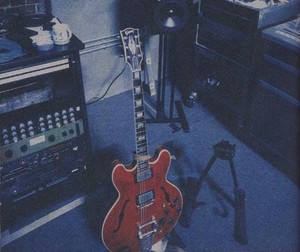Dig - Behind The Scenes
 Boz talks about the songs on "Dig"The way Dig was used by the old hipsters or in the jazz world, like enjoy it, like get into it, like go ahead and relax and have a good time with it. Its a rather small cast of characters, most of the work being done by David Paich, Danny Kortchmar and myself. I went to an old friend and collaborator David Paich who I had known from back in the 70's. David and I had written some things together that are in a rhythm and blues vein. He shares my love and my sort of interest in whatever contemporary form of rhythm and blues it may be as well as traditional forms of rhythm and blues. And Danny Kortchmar, a producer and extraordinary guitar player. We hit the ground running and every step seemed to be in place, the experience took off from the beginning. This trio, this triad, this combination of personalities happened to be perfect chemistry I think. The in-studio work just shot out of the box. We were working at a pace that none of us had ever experienced before. Rhythm and blues to us really takes a lot of forms and we were using some elements of contemporary hip-hop which I call rhythm and blues. Its just the current state of rhythm and blues. There's a little drum double time thing that happens in the song "Desire", in the hip-hop world its called timber light beat. So we borrowed a little from the new and a lot from the old. Its a style that I keep going back to and its a style that I like a lot. The guitar and I have had a long affair. Several of the songs, a song like "Desire" or a song like "Payday" were to some degree built around my guitar style and Danny Kortchmar (Kooch) is one of the best guitar players I have ever heard, ever seen in my life, and he knows how to set it up for me. He's a great rhythm player, a great comp player and he left me some wide open spaces. He recognised my style and where I could fit in well. "Payday" was probably the real cornerstone of this record. It has a spirit and a stride about it that I think really set the pace for everything we tried to do on this record. I think the spirit of that song is probably the driving force of the whole album. If there is a thread that runs through this album its that pretty much song for song you are talking about a string of losers who have lost out one way or another. From a world weary attitude of a "Thanks To You" song to maybe a vet who came back from Vietnam and never could put it together on pay day, to "Desire" to "I Just Go". They are a series of dead ends in some way. "Sarah" is just a dream, "Sarah" is a wonderful Southern Memphis dream. I can see the porch swing, I can feel the breeze, smell the honeysuckle. The engineer that I work with in my studio is quite an accomplished musician in his own right, Michael Rodriguez, he and I developed a few ideas together. There's a song "Miss Riddle" that happened to be just something that he was playing in the studio as I walked by the door one day, I went in and asked "what's that" ? Then a little further on in the process we asked Roy Hargrove Junior to try some horns on several tracks. This is the first one he did for us and the hairs stood on end when I heard what he read into that track. I think its a very very healthy time for music. To think of the complex rhythmic structures kids are getting when they are 7, 8, 9 and 10 years old in hip-hop. They are amazing groups, their cord changes are sophisticated, the instrumentations are complex and the arrangements are in some cases are brilliant. Kids are getting to it and its going to lead to other things, its going to lead to other musical forms. You can't be afraid to change, you can't be afraid to move into new areas and you have to explore your intuitions and your interests and keep looking for new ways to express yourself. You're not playing to a static audience.
|
|||||||

